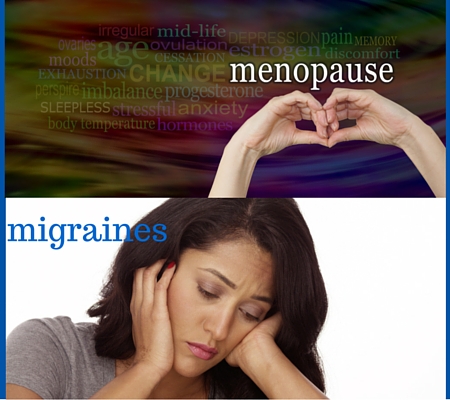Is Menopause or Peri-Menopause Increasing Your Migraines?
I was recently researching information about women and menopause-related migraines to pass on to you. From an experience standpoint, many women can tell you that around peri-menopause and during menopause it is possible migraines will increase in frequency and intensity. Conversely, for some women, once menopause either begins or ends, migraines may disappear.
However, a new study has found that migraines worsen as women approach menopause. According to Vincent Martin, M.D., a professor of internal medicine in the University of Cincinnati’s Division of General Internal Medicine and co-director of the Headache and Facial Pain Program at the University of Cincinnati Neuroscience Institute, “Women have been telling doctors that their migraine headaches worsen around menopause, and now we have proof they were right.” It seems that the risk for high frequency migraine, or more than 10 days with a headache per month, increased by 60 percent in middle-aged women with migraine during peri-menopause. Peri-menopause is, as you know, the transitional period into menopause marked by irregular menstrual cycles.
In this newest study, a group of doctors studied 3,664 women who experienced migraines before and during their menopausal years.
The menopausal years include both peri-menopause and menopause. As I’m sure you are aware, menopause begins when women have not had a menstrual period for one year. Some of the most common symptoms include hot flashes, irritability, depression, and insomnia.
“Changes in female hormones such as estrogen and progesterone that occur during the peri-menopause might trigger increased headaches during this time,” noted Lipton.”It is reported that the risk of migraine was most apparent during the later stage of peri-menopause, which is a time when women first begin skipping menstrual periods and experience low levels of estrogen,” added Dr. Lipton.
Women who participated in the study also reported that high frequency migraines increased by 76 percent during menopause. However, researchers think that it may not necessarily be the direct result of hormonal changes, but rather medication overuse that commonly occurs during this time. According to Dr. Martin, “Women as they get older develop lots of aches and pains, joints and back pain and it is possible their overuse of pain medications for headache and other conditions might actually drive an increase in headaches for the menopause group.
For the new study, researchers identified a group of women between the ages of 35 and 65 and had approximately 24,000 participants with severe headaches. These participants were followed annually over six years. In this research study, women with migraines were asked to self-report their frequency of headaches, as well as the characteristics of their menstrual cycles. Based on the characteristics of their menstrual cycles they were placed into one of three groups: Pre-menopause (normally cycling), peri-menopause (irregularly cycling), and menopause (no cycling).
So, it does appear from this study that there is a high likelihood that women have increased migraines during this period of time. “Physicians can prescribe hormonal therapies that level out these changes that occur during the peri-menopause and menopause time periods. If the patient is in early peri-menopause, you can give birth control pills that level things out. If they are in the late peri-menopause and they start skipping periods, they can be put on estrogen patches,” stated on of the researchers.
As an holistic health coach, it is my preference for people to use some type of natural hormone replacement-type therapy. There are several alternatives you can check into. One good product, especially for estrogen dominance, is Dr. Chi’s product, Myomin. You can also go to your health food store and look at a .cream hormone replacement (check out some varieties here). Prior to that, it could be helpful to find an independent lab to conduct a saliva test or have your doctor draw some blood so that you know what your hormone levels are. Once you have that information, you can then more accurately assess how to naturally manage your hormones and then see how the leveling of hormones helps your migraines.If you would like further information, please feel free to email me.
If you are struggling with your migraines and would like to learn how to incorporate some healthy alternatives and remedies into your daily lifestyle, including hormone balance, I would love to talk with you. Together we can discuss ways to minimize and reduce your migraines. I would love to help you achieve relief from pain and frequency of migraines. For your free consultation, click below.


I have recently started looking into this because one of my clients suffers from this also. Many thanks for sharing your experience!
This was really helpful information. I love Myomin by Dr. Chi. I’m in my early 30s but had estrogen dominance and suffering the many symptoms of that. It helped SO much with balancing my hormones. My mom is menopausal and it has reduced the severity of her hot flashes and migraines. It definitely works!
Lynn, this is a great wealth of information and will help so many who suffer. You are spot on in saying there is no one size fits all solution and to have your hormone levels checked. Thank you.
I loved your article post.Really looking forward to learn more.